Mada al-Carmel – Arab Center for Applied Social Research held its Annual Conference 2024, entitled “The 1948 Palestinians and the War on Gaza”, on Saturday, June 29, 2024 in Nazareth. The conference included an opening session and two research sessions, the first of which was on the subject of “Israeli Discourse and Policies during the War”, and the second on “Palestinian Intellectual and Political Discourse and Performance during the War”. In the sessions, researchers and activists presented research papers in which they examined the situation of Palestinians from the 1948 territories in the context of the war of genocide and ethnic cleansing that Israel has been waging on the Gaza Strip since October 7, 2023. Their research encompassed the political, legal, student-related, cultural and creative fields, among others.
The opening session
The opening speech of the conference was given by Dr. Areen Hawari, a researcher in feminist studies and Director of Mada al-Carmel. In her address, she stated, “As a Palestinian academic center and center for applied research, we must contribute to understanding our role and the mechanisms of oppression that are being used to silence and intimidate us. On the eve of this conference, we published a report about racism and oppression against us during the war. However, we also seek to read, analyze and perhaps conceptualize our own agency, or rather the obstruction of that agency, and to understand our silence and our fear, and what silence and fear say about the regime that looms over our heads and controls the land beneath our feet. We also ask what it says about our supposed citizenship, and about us and our political center, and what it could also have to say, if I may, about our complicity.” Hawari added, “It is expected that I, as a feminist researcher, for instance, will analyze structures of power and influence. However, the academic establishment in Israel and some of its ‘distinguished’ researchers have forgotten, and were perhaps even unaware, that we analyze existing phenomena and power dynamics not only in order to understand how they work and interact, but also to dismantle them and break them down.”
Dr. Elham Shamali, a researcher on the Palestinian issue and supervisor of Master’s degree students at the Al-Aqsa University in Gaza, then spoke from the Gaza Strip through a prerecorded speech in which she stated, “The decimation of the scientific, literary and academic capacity [of Gaza] is nothing but one more link in a long chain of targeting anyone who has a significant impact on Palestinian society, especially those with rare specialisms, and their absence leaves a huge void. It is difficult to find replacements for them even many years later, as they are the foundations of academic work in the Strip. As a result, Palestinian society is deprived of many influential symbols and active figures, and the assassination of these elites should not be seen as indiscriminate military acts, but rather as deliberate strikes against Palestinian society.” She added, “The outlook is bleak, and no one can predict the future of the educational process until the war has come to a complete end and Gaza recovers from this crazy war. It is impossible to conceive of what education will be like then, since the schools that remain intact despite the bombing are all being used to house the displaced.”
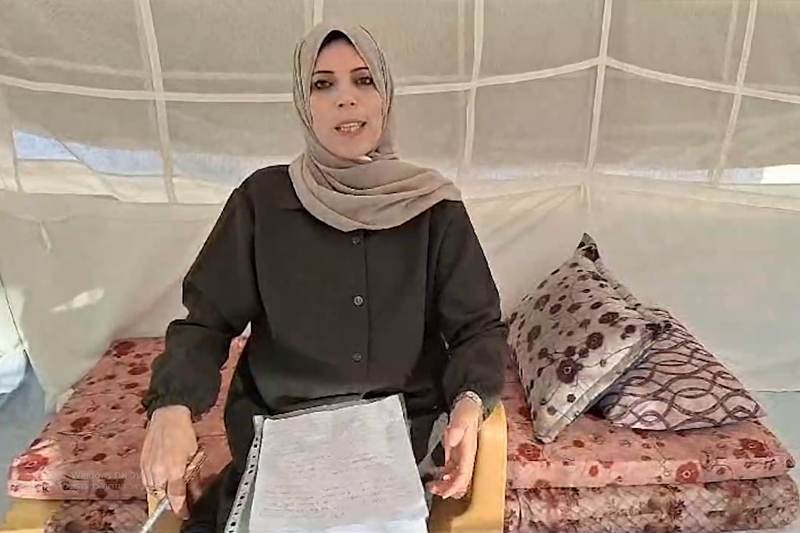
Dr. Mohanad Mustafa, a researcher in political sciences and Academic Director of Mada al-Carmel’s Graduate Studies Program, gave a talk that set the framework for the conference, entitled “The 1948 Palestinians and the War: Place and positionality”. In it, he argued that that we “must not forget, eight months into the war, that during its first three months, a sense of fear prevailed among 1948 Palestinians, a fear that the public conveyed to the leadership, and that the leadership conveyed back to the public, and that the elites in all sectors were part of it, without exception. What does this mean? It means that citizenship was not an illusion through which Israel engaged with us, but rather that it was a shallow citizenship, in a theoretical sense, one that we did not even dare put to the test during the war, because we have a deep awareness, intellectually and through our innate intuition, that it will not protect us. And that the state here is a project that has not been completed and will not be completed.” He added, “The people of Gaza have brought the issue of Palestine back to the fore, and we must grasp it, as all the Palestinian diaspora groups in the world are trying to reorganize themselves. We are not a diaspora; we are in the homeland and we are not organizing ourselves.”
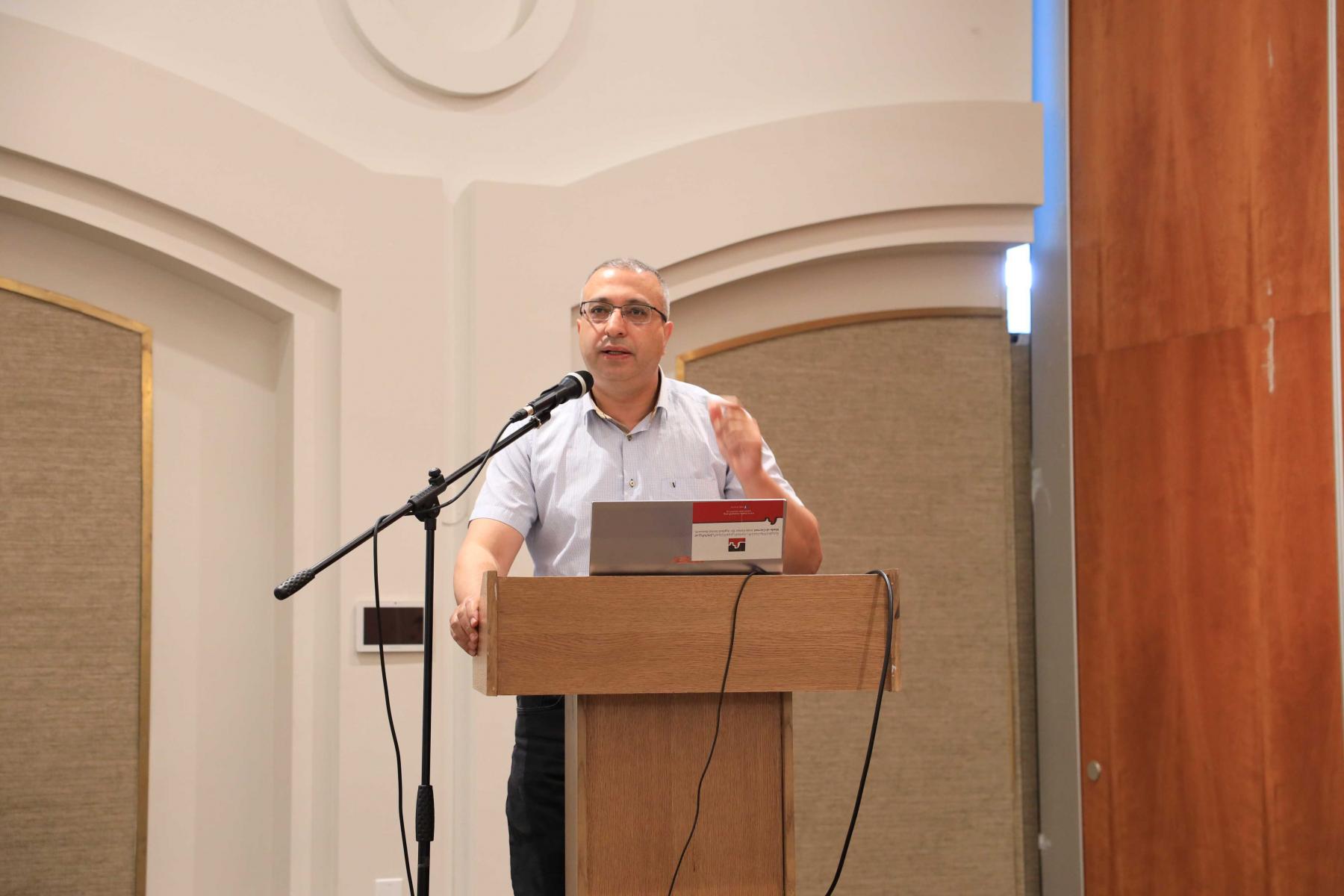
During the opening session, Dr. Mtanes Shihadeh, a researcher in political science and Director of Mada al-Carmel’s Israel Studies Program, presented the results of Mada al-Carmel’s annual public opinion survey, conducted in May 2024. He analyzed the data in a presentation entitled, “Attitudes among 1948 Palestinians towards the War on the Gaza strip and its Political Implications: Analysis of a public opinion survey”. As Shihadeh stated, “The war on the Gaza Strip has revealed the fragility and hollowness of the citizenship granted to the Palestinians in Israel, and its complete subordination to security motivations and requirements, and to the needs and conditions of the Zionist consensus. It has also led to the erasure of the political margin that was available to Palestinians in Israel in which to exercise their most basic rights, and to an attempt to impose new boundaries for political expression and action. Current Israeli measures being pursued against Palestinian citizens may become a permanent fixture after the war if the Zionist consensus is convinced of their effectiveness, and if they are not resolutely opposed.” Shihadeh also contended that, “The way in which the Arab political parties and the High Follow-Up Committee have dealt with these shifts and the new reality has been modest and tentative, and has not presented a challenge to the government’s policies and practices. The war on Gaza has not induced the Arab political parties, or Arab society in general, to re-examine its political projects, or at least reevaluate the political situation in light of the new reality that is taking shape in Israel, which may bring about a new and different stage in the relationship between Arab citizens and Israel.”
The opening session was moderated by Jowana Jbara, a PhD candidate in gender studies, and coordinator of Mada al-Carmel’s Annual Conference in 2024.
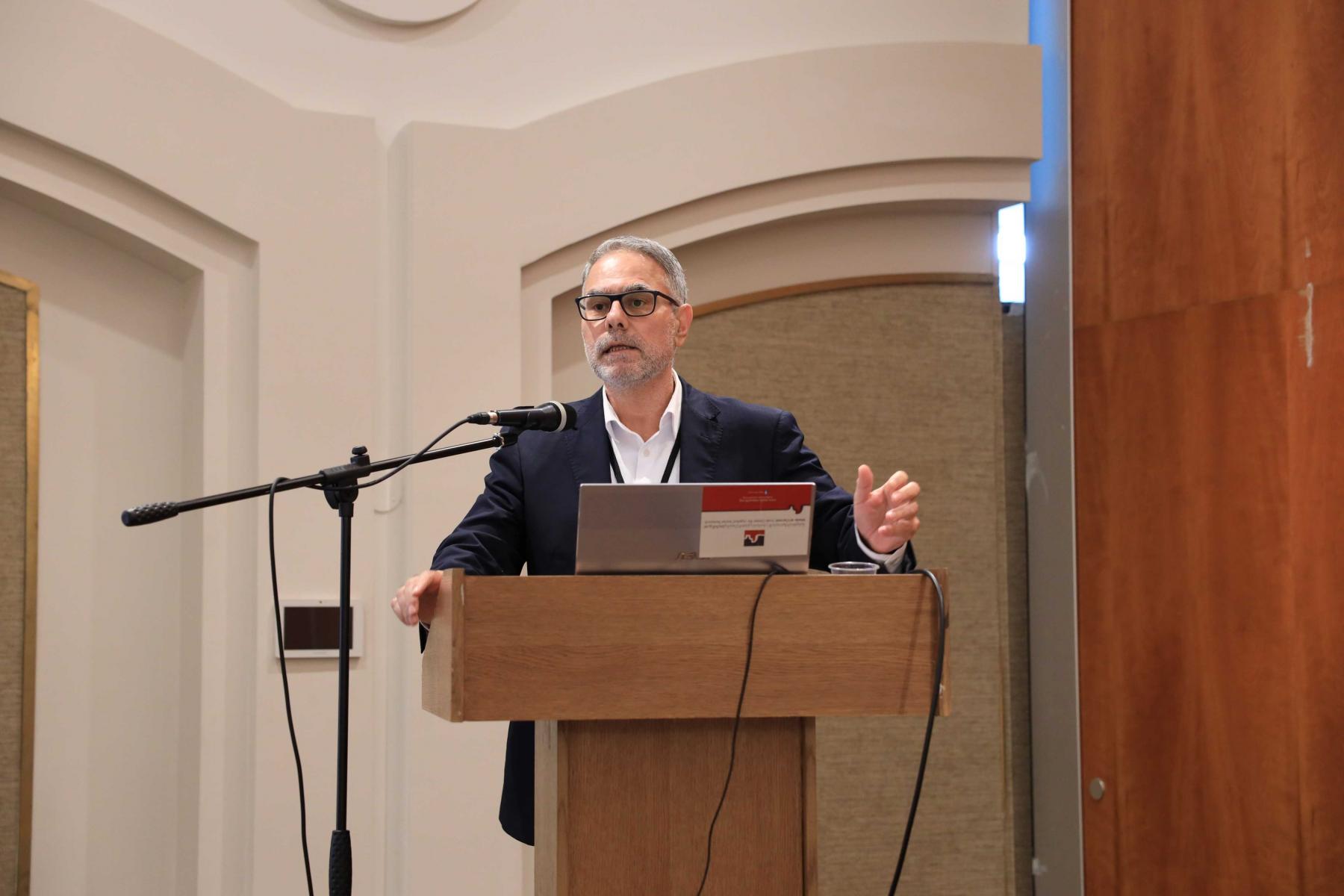
Session One – Israeli Discourse and Policies during the War
The first research session of the conference was on the subject of “Israeli Discourse and Policies during the War”. The first speaker was Dr. Honaida Ghanim, a researcher in political sociology, and Director of the Palestinian Forum for Israeli Studies (MADAR), who gave a speech entitled, “The Awakening of Sleeping Beauty: A reading of the discourse of the Israeli left”. As Ghanim stated, “After October 7, articles about ‘repentance’ proliferated in liberal as well as conservative Israeli newspapers, and any discussion of context related to the event was roundly attacked and met with accusations of superficiality. Expressions like ‘the issue is complicated’, and ‘the story is complex’, dominated the discourse of ‘awakening’, becoming a talisman that was thrown at anyone who speaks about colonialism, apartheid or occupation. Within this reality, the leftists return to the conceptual repertoire used by the tribal left back there, in Europe, to anti-Semitism and Kishinev, to the ghetto, drawing on perceptions that rationalize their experience, given that colonialism has become a blind spot for them.” Ghanim added, “The Israeli preoccupation, amid the shock, was with the horrific details of the event and the demand either to suspend the context, or deny any connection between the context and the event, or to focus on the moral dimension of the event, which, though important, does not explain anything. It has reached the point where the word ‘context’ has become a ‘bad word’, inspired by a poem by the Iraqi poet Maytham Radi, and any discussion of context is tantamount to an accusation. The Israeli discourse did not deny the context, but rather tried to level any talk about ‘occupation’, ‘colonization’ or ‘apartheid’, and accused anyone who did speak of them of being complicit, superficial or naïve.
The second talk of the first session was given by Yousef Taha, a student leader who has a Master’s degree in the humanities, with the title of “Palestinian Students in Israeli Universities: Between persecution and limited agency”. He stated, “The Palestinian students’ movement has been in a state of decline since the onset of the genocidal war on the Gaza Strip, which is understandable given the campaign of persecution waged against students since the start of the war, and the attempts that students and students’ movements have made to extricate themselves from this crisis peacefully. There are some within the students’ movements themselves who think that they should have played a more fearless role, and gone beyond the general political condition of the 1948 Palestinians, broken through the wall of fear and silence, and led and aligned with their people in the face of the war machine, that they should have integrated themselves into the global student movement that has created a new political format for Palestine around the world, with unprecedented levels of support for Palestinians and their cause.” Taha added that, “The performance of the students’ movements corresponded to a large extent with that of the Arab political leadership in Israel, which has identified this period as one of reorganization and preservation to avert collapse. The true test for the students’ movements in the coming period will be the attempt to rise and continue their activities, within the ceiling that they set in recent years, and given the significant shifts that have taken place within Israeli society and the widespread global campaign against Israeli academia. The latter could also influence university policies, which have also played a part in the campaign of silencing voices, persecution and surveillance against their students, and puts the universities to a new test that will determine the future of the relationship between Arab students and academics in particular, and of Israeli academic institutions generally.”
The third speaker of the first session was Mohammad Awwad, a lawyer and political activist, who gave a talk entitled, “1948 Palestinians and the Exchange Deal: Between enemy citizenship and naked citizenship”. As he stated, “The question to ask is: What is the nature of the citizenship that was granted to Palestinians in Israel? What is the nature of a citizenship that allows for differentiation among the individuals to whom it is given? The inclusion of female Palestinian detainees who hold Israeli citizenship in the recent prisoner exchange deal exposed the essence of this citizenship. The citizenship that is granted to Palestinians in Israel applies in its non-application, and expresses itself by doing nothing. The Palestinians do not exist outside the Israeli system, but are included within it through their exclusion from it. Unlike German citizens, for instance, who are outside the Israeli system and have no relation to it, Palestinians in Israel are included through their exclusion from it. The citizenship that is awarded to Palestinians maintains its relationship to them through its non-application to them, its abandonment of them, its forsaking of them, and its withdrawal from them. Which is to say that citizenship has lost its content, has become nothing but an empty principle, and therefore that it is impossible for it to protect us; instead, we are cast out of its protection.” Awwad further stated, “This theoretical framework is not restricted to the decision to include the female Palestinian detainees in the exchange deal for the release of Jewish detainees, but is rather an overarching framework that encompasses all of Israel’s practices against 1948 Palestinians after October 7, as an exceptional and constitutive event.”
The first research session was moderated by Tareq Khatib, a lawyer and political activist, and the host of Mada al-Carmel’s podcast.
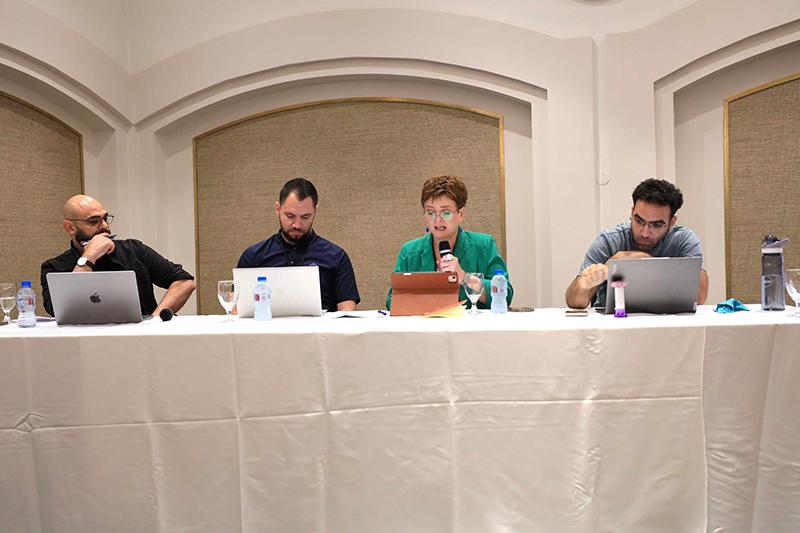
Session Two – Palestinian Intellectual and Political Discourse and Performance during the War
The second research session of the conference, on the topic of “Palestinian Intellectual and Political Discourse and Performance during the War”, was opened by Haneen Zoabi, a political activist and former Member of the Knesset for the National Democratic Assembly party. The title of her talk was “Delayed Transformation in the Island of 1948: When we fear politics”. In her presentation she stated, “The official political discourse of 1948 Palestinians during this phase is following a path of disconnecting their ‘struggle’, rather than integrating it, even when ‘objective’ reality calls for integration. And so even when the world and the young generations of Palestinians adopt a compelling discourse relating to the unity of the people and the homeland, in what appears to be rejection of strategic transformation by 1948 Palestinians, their rejection does not mean a refusal to engage in a plan of action or strategies of integration, but rather a refusal to theorize the idea. The official political discourse of the 1948 Palestinians has refused to entertain the imagined possibility of integration as a future horizon for political action, and even as the only form of political protection, whatever its current potential. Transformations, as the ‘Gaza moment’ has demonstrated, begin with imagination, and this paper was an attempt to search for imagination and not for reality, or in other words to search for the imagination of the present as a potential indicator of a future reality.” Zoabi added, “The greatest problem with this discourse is not only that it did not upend political assumptions, but that it is heading towards a withdrawal from politics, from the moment, from this phase. This makes it an exception, not only among the remainder of the Palestinian people, but also within the region and among activists worldwide. The official political discourse of the 1948 Palestinians thus stands out as a case of political autism.”
The second talk in the second session was given by Habeeb Makhoul, a researcher at Mada al-Carmel who has a Master’s degree in public policy, and was titled, “The Story of Uncle Tom: The 1948 Palestinians and political marginality”. He stated, “The state of house slave has two conditions, according to Malcolm X, the first of which is the existence of a relationship of master/slave, or colonizer/colonized, and the second is for a distinction between them to be recognized in the eyes of the slaves themselves. These two conditions are present in historical Palestine. Since 1967, the Palestinians have been divided into two main groups: the house Palestinians and the field Palestinians. The house Palestinians live with their masters, while the field Palestinians are outside the ‘walls’. Here, we can see the significance of the disparity in Israel’s treatment of the Palestinians as a condition for underpinning and elucidating this phenomenon.” Makhoul added, “Given the scale of the disaster and genocide that Palestinians in the Gaza Strip and the West Bank (the field Palestinians) are facing, the 1948 Palestinians (the house Palestinians) compare themselves to the former in terms of their treatment by the Israeli regime (the master). With this comparison, the crumbs that the Israeli regime gives to the 1948 Palestinians look better, according to some, and the losses that the house Palestinians stand to incur if they engage in the struggle will thus be greater, even though they do not actually change, for it is relative. Therefore, they will retreat and not take part in the struggle. During the ‘Dignity Uprising’ [the May 2021 Uprising], the difference between the master’s treatment of the house Palestinian and the field Palestinian was smaller, and the threat to the master and to his house was not on the scale of that which was presented by October 7. The demands made at the time were confined to a halt to the displacement of Palestinians from a number of homes in the neighborhood of Sheikh Jarrah, and there was no direct military operation against the master that he perceived to be an ‘existential threat’.
The third presentation of the second session was given by Jad Kaadan, a PhD candidate in cultural sciences and linguistics, with the title of, “How Do We Comprehend Genocide? An analysis of texts from the Palestinian cultural magazine Fusha”. Kaadan stated, “In this paper, a question was raised about how Palestinians comprehend and characterize the genocide in the Gaza Strip, via an analysis through a theoretical and philosophical framework that posits a dichotomy of the absurdity and sacrificial nature of death. A sample of texts published in the Palestinian cultural magazine Fusha indicates that there have been many varied attempts to conceptualize the suffering, death and genocide in the Gaza Strip since October 7, 2023. However, within this variety, a number of main themes emerged from the texts, the first of which is the theme of documenting and archiving. The process of documentation can be understood as an act of resistance against the anonymity of death (as ‘mere numbers’), and to the epistemic erasure of the Palestinian people and their concrete and collective history. Second is the theme of the speed and profusion of death. The factor of time is pivotal to the matter of how one deals with death psychologically, both from the point of view of the dying and from that of the family and relatives. Given the circumstances of the genocide in the Gaza Strip, it is impossible to predict the specific death of an individual, and nor is there the time necessary to deal with the death or news of the death. Third is the theme of the form that death takes in the Gaza Strip. This theme raises many issues, such as the importance of burial rituals and the act of bidding the deceased body farewell by family and relatives, as well as the relationship of these rituals to identity and collective history. Fourth was the theme of mythologization in relation to death and genocide. In the writers’ treatment of the subject of the use of myths to conceptualize death, two contrasting trends were apparent: first is the use of these myths as a way of approaching the horror of the events, while second is the rejection of this mythologization and the emphasis on humanizing Gazans and their simple lives, far removed from myths and ideals.”
The second session of the conference was moderated by Ali Mawasi, a poet, editor, and PhD candidate in cultural sciences. At the conclusion of the conference, Mawasi thanked the attendees and contributors to the conference, noting that the papers presented would be published in a book to be edited by Dr. Mohanad Mustafa and Dr. Himmat Zoabi.
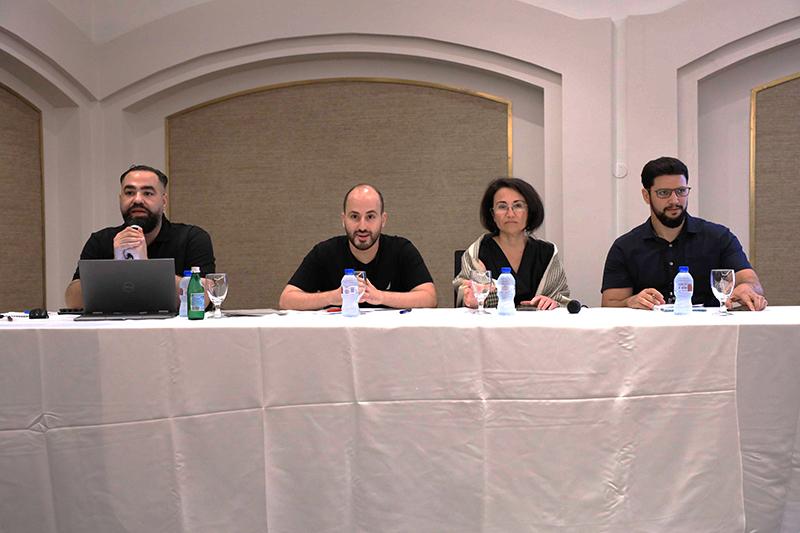
To watch a video recording of session two of the conference, please click here (in Arabic).
To see the program of the conference as a PDF file, click here (in Arabic) / here (in English).
To read about the speakers and summaries of their papers, click here (in Arabic) / here (in English).